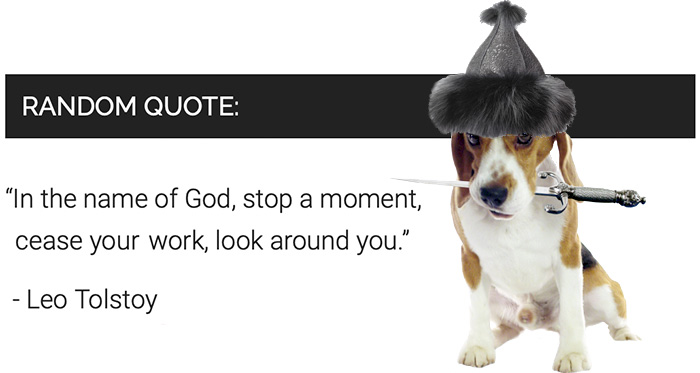Before Gandhi, there was Tolstoy.
When Leo Tolstoy was 54, he wrote a book about the ethical teachings1 of Jesus as revealed in the Sermon on the Mount. For the rest of his life, Tolstoy advocated the use of peaceful, non-violent forms of resistance in the struggle for social change.
Gandhi – the person we associate with peaceful, non-violent resistance – was 12 years old when Tolstoy’s book was published.
Martin Luther King – the man who popularized peaceful, non-violent resistance in America – would not be born for another 45 years.
In 1854, during the Crimean War, a British light brigade was ordered to charge the cannons of the Russian Empire.
A “light brigade” carried only light weapons, such as sabers and pistols.
Alfred Lord Tennyson wrote about this famous headlong charge toward certain death:
Half a league, half a league,
Half a league onward,
All in the valley of Death
Rode the six hundred.
“Forward, the Light Brigade!
Charge for the guns!” he said.
Into the valley of Death
Rode the six hundred.
“Forward, the Light Brigade!”
Was there a man dismayed?
Not though the soldier knew
Someone had blundered.
Theirs not to make reply,
Theirs not to reason why,
Theirs but to do and die.
Into the valley of Death
Rode the six hundred.
Cannon to right of them,
Cannon to left of them,
Cannon in front of them
Volleyed and thundered;
Stormed at with shot and shell,
Boldly they rode and well,
Into the jaws of Death,
Into the mouth of hell
Rode the six hundred…
Leo Tolstoy was a Russian artillery officer in that war and was forever changed by it.
That war – the first modern war – led Tolstoy to the Sermon on the Mount and convinced him of the truth of Jesus’ words.
“Blessed are the peacemakers… blessed are the meek… blessed are the merciful…”
Tolstoy was nominated for the Nobel Peace Prize 3 times, but each time he wrote to the committee and asked them to remove his name from consideration.
When the public grew angry that Tolstoy never received the Nobel, he confessed that he had privately rejected it and wrote,
“First, it has saved me the predicament of managing so much money, because such money, in my opinion, only brings evil. Secondly, I felt very honored to receive such sympathy from people I have not even met.”
Tolstoy was loved by everyone except religious leaders.
Remember that book he wrote in 1882 about the ethical teachings of Jesus? It did not appear in Russia for 24 years because it was blocked by the Orthodox Church, the leaders of the Christian faith in Russia. They were worried that Tolstoy might have been talking about them when he wrote,
“I sit on a man’s back, choking him and making him carry me, and yet assure myself and others that I am very sorry for him and wish to ease his lot by all possible means – except by getting off his back.”
The religious leaders became angry again when Tolstoy wrote,
“Everyone thinks of changing the world, but no one thinks of changing himself.”
Mark Twain, a contemporary of Tolstoy, may well have been making a joke about religious leaders in America when he wrote,
“By trying, we can easily learn to endure adversity. Another man’s, I mean.”
Tolstoy saw Jesus and his teachings as gold surrounded by the mud of religiosity. He said,
“Truth, like gold, is to be obtained not by its growth, but by washing away from it all that is not gold.”
This reminds me of Michelangelo’s description of how he carved an angel from a block of marble:
“I just removed everything that was not angel.”
I will leave you now,
to consider all that you have been told,
and wash the mud from the gold,
and remove everything
that is not angel.
Roy H. Williams
1 Tolstoy’s A Confession, (1882) was originally titled, An Introduction to a Criticism of Dogmatic Theology.
NOTE: Dogmatic Theology has nothing to do with dogs. – Indy Beagle
